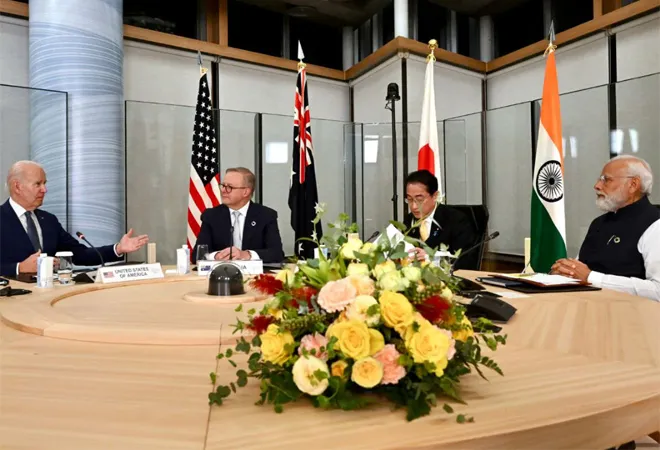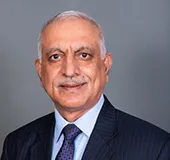-
CENTRES
Progammes & Centres
Location
Contrary to media narratives, the 2023 Summit has firmly anchored the Quad and made it abundantly clear that the grouping is here to stay

Just a week before the leaders’ meeting, the 2023 Quad Summit scheduled on 24 May in Sydney, Australia, was called off due to the inability of the United States (US) President to join. It was indicated that the reason for President Biden’s was urgent domestic requirements in the US. The level of the US national debt at that time was very close to the existing debt ceiling of US$31.4 trillion, and a political consensus was necessary to raise the debt ceiling. This cancellation (along with the cancellation of the scheduled visit of the US President to Papua New Guinea for the Pacific Island Forum Leaders’ Summit) led to some negative commentary in the media for the US not ‘showing up’ at strategically important summits at a critical juncture. The US administration was quick to respond to the criticism, highlighting the substantial and multi-dimensional progress made—and being sustained—in the Indo-Pacific cooperation frameworks and arrangements. In a swift move, the Quad Summit was then advanced by four days and took place on 20 May 2023 on the sidelines of the G7 Summit in Hiroshima.
The US administration was quick to respond to the criticism, highlighting the substantial and multi-dimensional progress made—and being sustained—in the Indo-Pacific cooperation frameworks and arrangements.
Setting the agenda at leadership summits
The first Leaders’ Summit of the Quad, held virtually in March 2021, had outlined the vision and purpose of this grouping (in its new and formal reemergence). It stressed that its primary objective was to cooperate on common challenges facing the Indo-Pacific region. Three working groups—on vaccines, critical and emerging technologies, and climate—were announced. A more comprehensive agenda was outlined in the statement issued after an in-person summit was held in Washington in September 2021. It spoke about broadening cooperation in other areas, including cyber, space, counterterrorism, international and maritime law, and education. A Quad infrastructure partnership was announced, with an intent to cooperate in this area with the G7, the G20, and the European Union (EU), and some ongoing infrastructure initiatives. It also included a brief mention of the progress made under the three working groups set up earlier and promised delivery of one billion safe and effective COVID-19 vaccines by the end of 2022.
Another virtual summit was held in March 2022, and a brief statement reiterated a few of the points made in earlier statements. The Russia-Ukraine conflict was mentioned in general terms, with a focus on humanitarian aspects. The next in-person summit, held in Tokyo in May 2022, covered a much broader agenda, with an elaborate statement organised under different sections. Peace and stability were introduced as the first section, underlining the linkage between stability, security, and development, and the delivery of public goods. It emphasised the Quad’s focus on the delivery of promises and highlighted some tangible benefits for the Indo-Pacific region. It indicated a US$50 billion assistance for infrastructure over the next five years and cooperation on 5G supplier diversification and semiconductor supply chains. It announced the launch of Quad Climate Change Adaptation and Mitigation Package (Q-CHAMP), Quad Cybersecurity Partnership, Principles on Critical Technology Supply Chains, the Indo-Pacific Partnership for Maritime Domain Awareness (IPMDA), and the Quad Partnership for Humanitarian Assistance and Disaster Relief in the Indo-Pacific.
A Quad infrastructure partnership was announced, with an intent to cooperate in this area with the G7, the G20, and the European Union (EU), and some ongoing infrastructure initiatives.
The Hiroshima Summit
The joint statement after the third in-person summit in Hiroshima highlighted that it was hosted by Australia in Japan. It was evident that detailed planning and preparation had been undertaken in the run-up phase, which enabled smooth and effective conduct at another venue on short notice. It stressed the shared vision of the Quad and the importance of mutually agreed principles in crucial areas in a rapidly changing and uncertain world. A special focus on cooperation with the Association for Southeast Asian Nations (ASEAN), the Pacific Islands Forum (PIF), and the Indian Ocean Rim Association (IORA) was highlighted. Progress, plans, and new initiatives were outlined under the critical pillars of climate, health, infrastructure, technology, cyber, space, and maritime. A new counterterrorism working group, agreed upon at the Quad foreign ministers’ meeting in March 2023, was ratified.
New principles on critical and emerging technologies, clean energy supply chains, and cyber security of critical infrastructure were outlined. New announcements included the Quad partnership for undersea cable networks, the Quad investor network to be led by the private sector (under the technology pillar), and the Quad infrastructure fellowship programme. Of particular significance was the plan to share expertise and experience in Space Situational Awareness and to expand the IPMDA to the Indian Ocean Region.
While China was not named as per the Quad norms, numerous references related to shared concerns pointed unmistakably towards China. Slowly but surely, the Quad statements have become more emphatic on the challenges posed by Chinese behaviour and actions.
A new counterterrorism working group, agreed upon at the Quad foreign ministers’ meeting in March 2023, was ratified.
For the first time, the objective of strengthening and reforming the global multilateral system and supporting the United Nations’ reform and expansion agenda was mentioned in the Quad statement. Specifics regarding a coordinated pathway and follow-up action have, however, not been indicated.
Progress on the agenda and looking ahead
In the last two years, the initial working groups (vaccines-expanded later to health, critical technologies, climate) and subsequent working groups (infrastructure, space, cyber) have made progress. The range and depth of cooperative partnerships and programmes have increased significantly. It has gained good momentum in the alignment of strategies, fundamental principles, and delivery mechanisms in diverse areas related to development and collectively countering the coercive strategy of China. With strong foundations in place, the grouping is now in a position to take its cooperation to a higher level. The overall perception of the Quad has also become more positive since 2021, particularly in Southeast Asia. More tangible outcomes are likely to become apparent in the coming months. These should, however, be supported by relevant data, particularly in areas related to the delivery of public goods in the region.
There is scope to build on the Quad’s agenda for promoting peace, security, and stability while staying well-below the threshold of a military alliance, a role taken up by the AUKUS— a trilateral security pact between Australia, the United Kingdom, and the United States. Days before the Hiroshima Summit, the first meeting of military chiefs of the Quad countries in Los Angeles was significant and set the stage for initiating a security dialogue or a meeting of the Quad defence ministers. The expanded joint naval exercise, Exercise Malabar, is increasingly seen by many as a Quad exercise, notwithstanding its history and evolution. The exercise is being hosted by Australia for the first time in August 2023 and will be of particular relevance.
Days before the Hiroshima Summit, the first meeting of military chiefs of the Quad countries in Los Angeles was significant and set the stage for initiating a security dialogue or a meeting of the Quad defence ministers.
The Quad agenda is now firmly in place. It covers a large spectrum with significantly enhanced cooperation. It has also given a major boost to bilateral cooperation among the Quad members and contributed towards enhancing mutual areas of convergence and adapting to those with divergences.
Upon cancellation of the Sydney Summit, the Global Times carried a story with a cartoon depicting the US President struggling to move US diplomacy forward, weighed down by the heavy burden of US debt. It concluded that “The cancellation of the Sydney summit is a fatal blow to Quad.” The Hiroshima meeting and the developments over the last two years, however, convey a very different picture. Far from a “fatal blow”, the 2023 Summit has firmly anchored the Quad and made it abundantly clear that the grouping is here to stay. That said, the Quad itself must sustain its focus on delivering outcomes, improve the effectiveness of counter-coercion, and show results in its intent of stepping up cooperation with the ASEAN, PIF, IORA and other countries of the Indo-Pacific region.
Vice Admiral Girish Luthra is a Distinguished Fellow at the Observer Research Foundation
The views expressed above belong to the author(s). ORF research and analyses now available on Telegram! Click here to access our curated content — blogs, longforms and interviews.

Vice Admiral Girish Luthra is Distinguished Fellow at Observer Research Foundation, Mumbai. He is Former Commander-in-Chief of Western Naval Command, and Southern Naval Command, Indian ...
Read More +